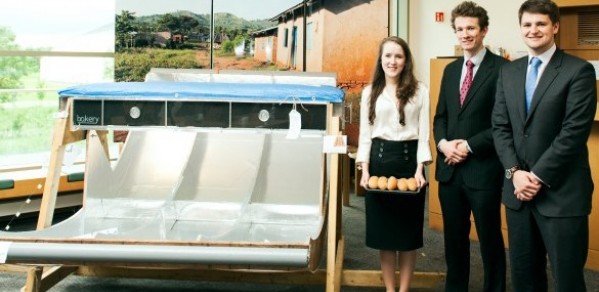
The Design Show is held each year by the Institute for Manufacturing (IfM) for an invited audience of local industrialists and designers. Students create displays to explain the technical and business ideas behind the products, together with design details and prototype models of the products themselves.
The ten projects this year covered social entrepreneurship, safety, health, sport and more.
IfM
The show is the culmination of team-based projects in which the Manufacturing Engineering Tripos (MET IIA) students find a design-based solution to a problem, create a marketing plan and present their ideas to their peers. The ten projects this year covered social entrepreneurship, safety, health, sport and more.
Please click the titles below to view a video by each team describing their project.
A solar bakery for equatorial countries which autonomously tracks the sun and ventilates to provide a constant baking temperature
Infinity Bakery plans to work with charities to provide ovens that allow existing bakeries to switch from firewood to solar power, and partner with micro-financiers to empower groups of entrepreneurs trained at these bakeries to set up satellite bakeries. The oven mimics the baking times of a fire and requires no additional input, as a self-tracking and temperature regulating solution.
Team: Leyla Sudbury, Daniel Cox, William Hatcher and Keno Marie-Ghae (pictured above)
A low-cost prosthetic wrist joint
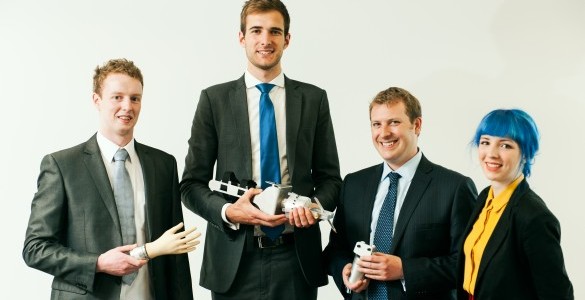
FlexiWRIST Prosthetics aims to revolutionise wrist technology. By adding a small technological improvement to the design, large improvements in functionality can be achieved, resulting in more natural movement for certain tasks. The FlexiWRIST is unique in that it uses silicone rubber to provide certain motions passively and offers a simple return mechanism.
Team: Chris Goodfellow, Daniel Brackenbury, Stephen Hall and Emma Clement
A shelter for refugees and those who have lost their homes in disaster areas
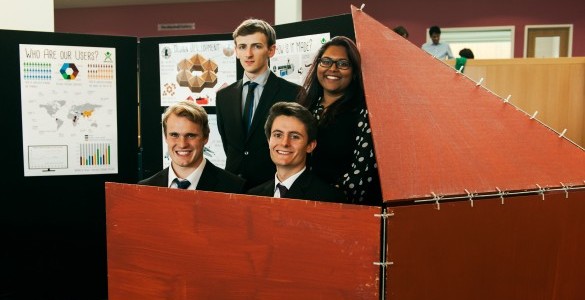
It has the unique ability to tessellate with other shelters to build communities. The Hive Aid shelter centres on the provision of uniquely designed poles as a framework onto which panels are slotted. Each plastic pole comes from the same extrusion, and has three flexible slots to connect the panels at a range of angles. They are extruded in the UK then transported to the site alongside other emergency supplies such as food, medication and clothing.
Team: Jack Bews, Charles Holland, Sam Blackett and Sasha Nagarajah
A solution to ultra-low cost sleeping to ensure that everyone has access to a bed
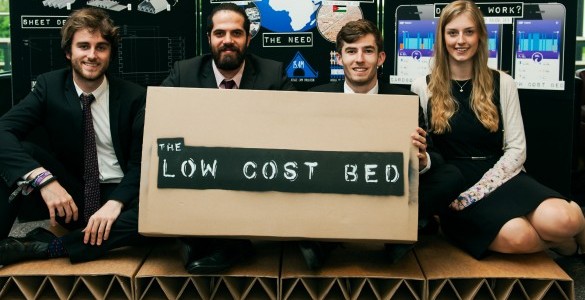
The bed is designed for use in homeless shelters in the UK, particularly during winter when bed shortages occur, as many can be stored by day and placed on the floor at night. It is also designed for disaster relief situations where the immediate needs of people have been met, providing an additional level of comfort and tackle problems caused by sleeping on damp or hard ground. The bed will fold flat for transport and storage, is water resistant for damp or humid conditions.
Team: Richard Cadman, Jonathan Godden, Tayo Moore and Stephanie Brown
A platform to control the physical environment which acts as a portable sensory room to calm children with ASD
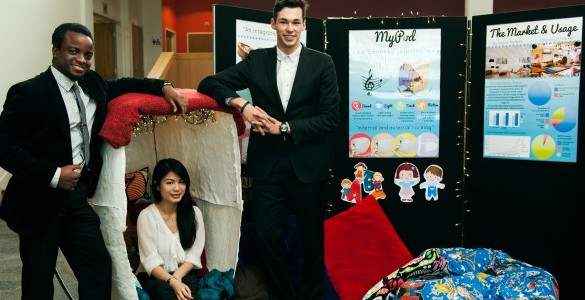
MyPod’s main function is to offer relaxation techniques in the form of rocking and pressure application, both of which are techniques that have been validated by psychologists. The sensory pod can be rocked externally by a teacher or parent, which makes for easy interaction during the calming period. Rocking can also be generated internally, by the users themselves so they can feel independent if they want to. To facilitate its use in the classroom, MyPod aims to offer sensory reduction, mainly in the form of sound cancelling and light channelling to reduce distractions.
Team: Joseph Mambwe, Sarah Tong and Bruno Sussat
Making skiing more accessible for the blind and partially sighted through use of tactile feedback in the ski poles
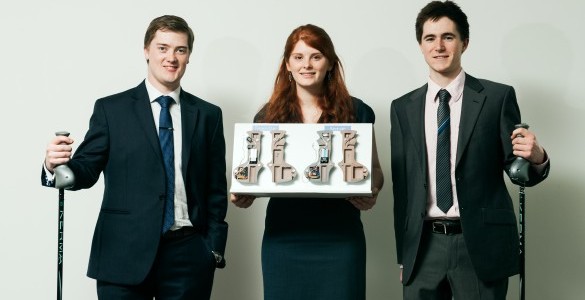
The Piste Pilot is designed to be picked up by a blind skier on holiday with a sighted friend using an interface that can be mastered quickly. The product will be provided as four integrated ski poles – two for the guide and two for the skier with sight loss. The skier will receive vibrations in their ski poles, triggered by a series of button presses from the guide on their own poles. The information given will include direction, how hard to turn and when to start/stop. This will be achieved wirelessly using radio communications.
Team: Christopher Owers, Elizabeth Tyler and David Elliott
Aiming to save lives by reducing fire service response times
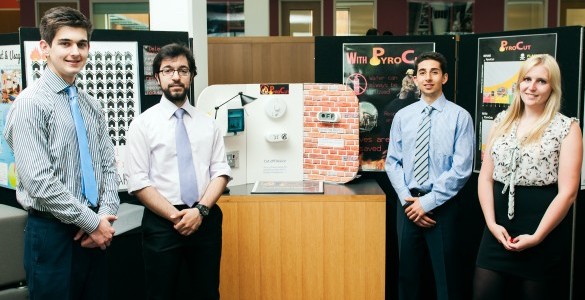
PyroCut automatically isolates the power supply in the event of a fire. Once a fire has been detected, there is a three-minute time delay before the power is isolated, ensuring sufficient time for the occupants of a dwelling to exit, as well as allowing them sufficient time to address a false alarm. Once these three minutes have elapsed, the power is isolated and a signalling device is activated. This device demonstrates to the fire service that the power is off and water can be used to tackle the fire.
Team: James Popper, Leonidas Aristodemou, Kamran Tajbakhsh and Jessica Manning
A pill dispenser for those starting to encounter cognitive or physical difficulties with their self-administration of medication
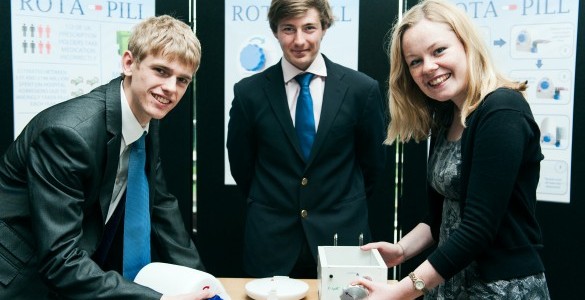
The Rota-Pill dispenses medication directly from personalised blister packs filled for patients at the pharmacist. The user must simply turn the dial to the current time and pills intended to be taken then will be dispensed into a cup for easy consumption. The simple mechanical system combined with smart use of ergonomic principles makes the Rota-Pill easy to use and will prolong the independence of users.
Team: Jack Beattie, Tim Palmer and Ciara Wheeler
A ski lock which is directly integrated into the ski brakes
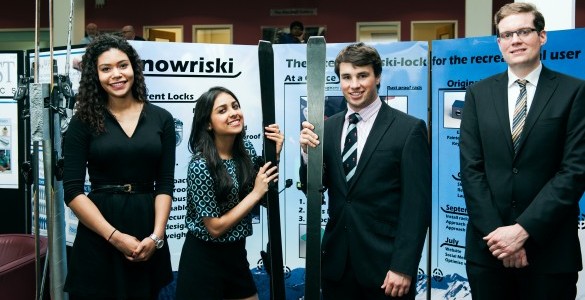
Snowriski has designed an innovative locking mechanism for a pair of skis. This new design is built within the skis themselves, relieving the skier of carrying the lock around or forgetting to take it along in the first place. With ski theft becoming an increasing problem in ski resorts across the world, this lock is more than a deterrent. Its robust and compact design locks the brakes on one ski to the other around a uniquely compatible Snowriski rack. In addition to these features, this lock is designed to be waterproof and iceproof, unlike those on the market today.
Team: Renate McKenzie-Onah, Anahita Pradhan, Guy Peters and Thomas Nesch
A rapidly deployable market stall for Cambridge’s historic outdoor market
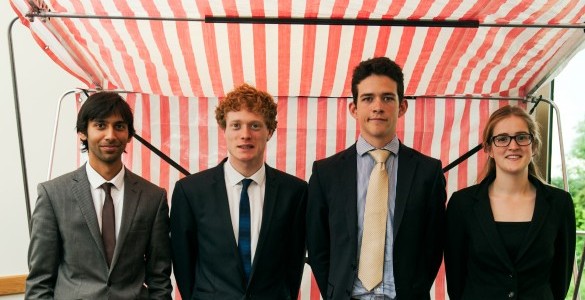
It can be set up in less than 15 minutes, is aesthetically pleasing and made using material and labour sourced as locally to Cambridge as possible. It collapses into a bench, providing storage space for stallholders, seating for the public and turning the square into mostly open space. The benches can be fork-lifted away to free the square completely. The spacing between the stalls can be modified to facilitate van access.
Team: Shakti Kumpavat, Thomas Cole, Nicholas Schulman and Stephanie MacAulay

